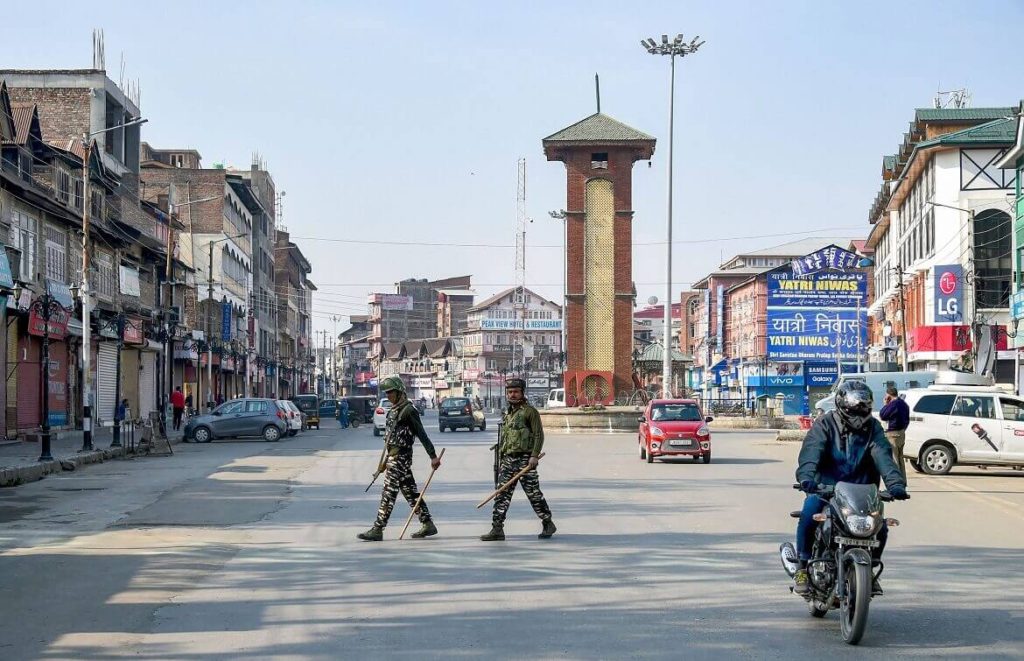By Farhan Ahmed
In human biology, the nucleus lies at the center of the cell, overseeing all functions of the cell. Similarly, Kashmir serves as the nucleus, with Pakistan, China, and India connected to it from all sides.

This underscores the geopolitical and geostrategic importance of the Kashmir region. All three countries have vested interests in the area. Currently, Jammu and Kashmir is divided into four administrative units: Azad Kashmir and Gilgit Baltistan under Pakistan’s administration, Indian-occupied Jammu and Kashmir, and Ladakh under Indian control. Whereas, Aksai Chin, an area devoid of human life but of crucial strategic importance, is part of the region. This article will discuss the complex nexus of geopolitical chess involving three nuclear powers in South Asia.
Analyzing the Jammu and Kashmir region itself, it becomes clear that geopolitically, it holds much importance in South Asia. Kashmir serves as the land trade route connection between South and Central Asia, eventually linking to Europe and Russia. Furthermore, Kashmir also shares borders with Afghanistan, which stands at the crossroads between Central and South Asia. Also, for China, one of the major initiatives and developmental projects under the Belt and Road initiative is the China-Pakistan Economic Corridor (CPEC), passing through Gilgit-Baltistan. India has a territorial claim on this region.
CPEC aims to connect the southwestern Gwadar port of Pakistan with the northwestern region of Xinjiang, providing China with direct access to the warm waters of the Arabian Sea. In this age of increasing globalization, the importance of land and sea trade routes has also rapidly increased. Thus, CPEC is expected to strengthen China’s economy and bolster its emergence as a dominant regional power in South Asian politics.
India’s opposition to CPEC stems from its territorial claim on the Jammu and Kashmir state, which includes Gilgit Baltistan as an integral part.
Indian designs to sabotage CPEC are rooted in its reluctance to see Pakistan become economically strong and to witness the strengthening of Pakistan’s relationship with China. Secondly, as India perceives itself as the key player in the region, it has garnered substantial support from Western countries to act as an obstacle n the way of Chinese advancement.
Indian claims on Kashmir are based on the much-contested Instrument of Accession, which India asserts was signed by the Maharaja of Kashmir. However, Pakistan disputes Indian claims, and the United Nations Security Council (UNSC) has also refused to accept the Indian claim. This is why Kashmir is one of the oldest disputes on the agenda of the United Nations Security Council. The UNSC has passed a number of resolutions advocating for the right to self-determination of the people of Jammu and Kashmir.
India’s strategic interest in Kashmir is significant because without Kashmir, India would lack geopolitical importance. The rationale behind this lies in the fact that without Kashmir, India would not have land route access to Central Asia and Russia. Therefore, it can be observed why India has forcefully and illegally occupied a major part of the territory without any legal justification and against the will of the people of Kashmir.
Pakistan’s claim on Kashmir is based on two fundamental, legal, and historic principles. First, according to the June 3 Participation Plan, Jammu and Kashmir naturally became part of Pakistan due to its majority Muslim population and geographical proximity to Pakistan. Secondly, the people of Kashmir, through the majority party in the Parga Sabha in 1947, advised the Maharaja of Kashmir to join Pakistan. Thirdly, as stated by Quaid-e-Azam, “Kashmir is the jugular vein of Pakistan.” He emphasized this because Kashmir is the primary source of water for Pakistan. Consequently, each nuclear power has its own interests in the region based on its geography and location, leading to unpredictable shifts in the politics of the South Asian region.
Due to its strategic importance, the interests of major powers in the region continue to evolve. At the beginning of the conflict, the United States and other Western powers sided with Pakistan’s perspective, supporting the people’s right to decide their political future, while the USSR and its allies consistently took the opposing stance.
India and Pakistan engaged in at least three full-fledged wars over Kashmir, and relations between the two countries never improved, remaining susceptible to serving the interests of international actors.
After the end of the Cold War, the international political and strategic paradigm shifted. India became increasingly closer to the West and the eventual India-US strategic partnership cast its shadows on US-Pakistan relations and US position on Kashmir. It must be noted that even in this changed position, United States did not consider Kashmir as part of India. Instead, the US has been urging India and Pakistan to resolve the Kashmir issue through bilateral talks.
The possibility of bilateral talks is close to impossible because the conflict has evolved into a humanitarian crisis. Indian occupation forces have engaged in armed hostilities and have even gone against United Nations resolutions. Therefore, the United Nations should play its role as a mediator, but it does not.
The US and China, being competitive with each other, would not want to facilitate each other’s growth at the expense of their own diplomatic efforts. This explains why the United States does not want to mediate the Kashmir issue’s talks between Pakistan and India. Doing so might bring forth fruitful conditions in the region, decrease militarization, reduce environmental damage, and make the Belt and Road Initiative successful. It would ultimately lead to the economic boom of China, as its economic growth would rapidly increase. China will gain the opportunity to economically connect with the Middle East and surrounding countries. Thus, it all remains a complex web in which each country is trying to maximize its foothold and gain maximum benefit, even if it means adopting fascist policies and increasing militarization in an occupied area.
China, Pakistan, and India have strategic interests in Kashmir due to its geographical location, natural resources, and strategic position. These interests shape the dynamics of South Asian politics in multiple ways.
Farhan Ahmed – Student of Peace and Conflict Studies at National Defense University, Islamabad. He is currently serving as an intern at Kashmir Institute of International Relations.
(The views expressed in this article belong only to the author and do not necessarily reflect the views of World Geostrategic Insights)
Image Credit: PTI/File







